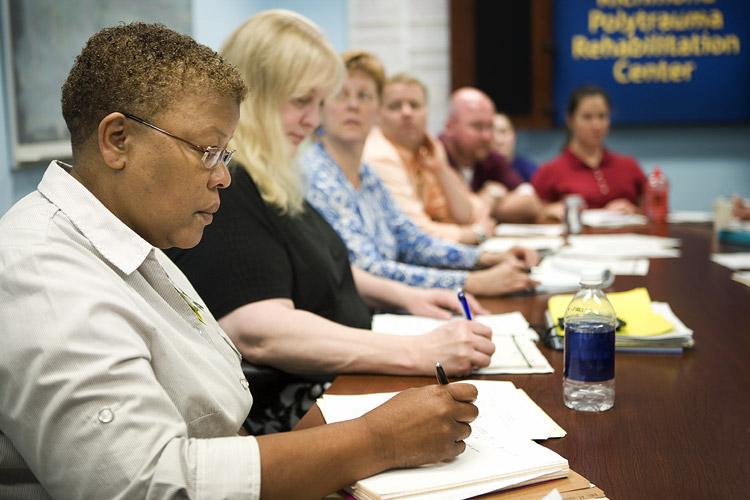Support Services

Logistical Support
Families may face significant financial sacrifice as they stay with their loved one through the rehabilitation process. Generous donations from VA Voluntary Services, Operation Helping Hand, Fisher House Foundation, local businesses, and other foundations and agencies frequently provide free housing and free or discounted meals. The polytrauma point of contact or your loved one's case manager will be able to help you identify and access these resources.
Clinical Support
Every polytrauma injury is different. It is difficult to compare injuries and it is extremely difficult to compare different patients' responses to rehabilitation. Some patients have lengthy stays in an acute, inpatient rehabilitation program and other patients receive their care through outpatient services. While some patients treated in the Polytrauma programs are able to return to Active Duty, pursue school, or return to work, others will continue to need more intense supportive services and care. All will continue to receive care and support from VA throughout their life.
Polytrauma injuries affect the injured individual, as well as his/her family. The Polytrauma team works closely to help families keep abreast of their loved one's medical condition, as well as their progress through rehabilitation. VA staff members actively engage family members in treatment decisions, including discharge planning. If the patient is discharged home, family members are invited to join therapy sessions prior to discharge so that they can learn how to help the patient be as independent as possible at home.
Prior to discharge from a Polytrauma Rehabilitation Center, family members may be scheduled to stay with the patient in a family training apartment. This allows family members to experience what the return home may be like for their loved one while rehabilitation staff and nursing are available to answer questions, address unexpected problems, and provide the emotional support a family may need as they prepare for this new phase of rehabilitation.
Emotional Support
VA recognizes the emotional stress that family members face while dealing with the realities of their loved one's life after a polytrauma injury. Our facilities offer family support, education sessions, and family counseling services to help families cope with adjustment issues following injury.
- Caregiver Fact Sheet (PDF 600 KB) | en Español (PDF 280 KB)
- Older Veterans Fact Sheet (PDF 800 KB) | en Español (PDF 350 KB)
Social Work
Social workers can be found in all program areas in VA medical centers, and are ready to help with most any question or concern. A social worker can help a Veteran or Servicemember seek financial or housing assistance, apply for benefits from the VA, Social Security, and other government and community programs, arrange for respite care for his or her caregiver, and other critical aspects of life. Learn more at http://www.socialwork.va.gov/socialworkers.asp.
The Department of Veterans Affairs Vet Center program operates 232 community-based counseling centers across the country. Vet Centers provide individual, group, and family counseling to all veterans who served in any combat zone. This service may be provided free of charge to the Veteran and/or family members.
Services include:
- individual and group counseling
- marital and family counseling
- bereavement counseling
- employment counseling
- guidance and referral
- alcohol and drug abuse assessments
- information about and referral to community resources
- outreach and community education
Supportive services are available at each PRC to help you and others involved in the caregiving role to understand and cope with the rehabilitation process. We also encourage you to recognize the importance of taking care of yourself while caring for your injured family member. Our supportive services for families and caregivers are provided by a variety of team members, including psychologists, social workers, family therapists, chaplain services, and the military liaisons. At each PRC, Voluntary Services help your treatment team coordinate the link between the VA health care system and other community-based organizations. They provide information to families about local resources such as faith-based communities, veteran support organizations, local lodging accommodations, transportation arrangements, and attractions. All four PRCs have a Fisher House available on site for families to utilize. Information about these resources is available through your PRC case manager.



















